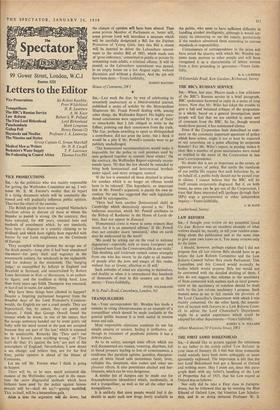Letters to the Editor
Vice Prosecutions Sir Robert Boothby,
Peter Wildeblood
Tranquillisers D. R. Laurence The BBC's Russian Service A. M. Kaye Law Reform Robert S. W. Pollard The First Lord Birkenhead lord Birkenhead Passchendaele Mark Longman Gallup Poll Henry Durant (2) Haystacks and Needles Professor). A. Lauwerys
The Nineties and Sixties .
Group Captain G. Simon Marshall
Medical Men as Writers . Dr. D. R. Cargill Berkshire's Water Supply T. P. Lawrence De-Federating in Central Africa Thomas Fox Pitt
VICE PROSECUTIONS Si,.—As the politician who was mainly responsible for getting the Wolfenden Committee set up, I wel- come Mr. E. M. Forster's verdict that its report is a flying document which will be constantly dis- cussed and will gradually influence public opinion. That was the object of the exercise.
The British people have never accepted Nietzsche's excellent advice to distrust all those in whom the impulse to punish is strong. On the contrary, they have tolerated, far 400 years, criminal laws and methods of punishment which, by any standards, have been a disgrace to a country claiming to be civilised; and which have rightly been regarded with horror by our Latin neighbours on the Continent of Europe.
They accepted without protest the savage use of the death penalty—long after it had been abandoned elsewhere—for petty theft and vagrancy in the seventeenth century, for witchcraft in the eighteenth, and for sodomy in the nineteenth. The 'hanging judge,' as exemplified by Jeffreys in England and Braxfield in Scotland, and immortalised by Robert Louis Stevenson in Weir of Hermiston, is an authen- tic figure; and the tradition is dying hard. Less than forty years ago Edith Thompson was executed, in fact if not in name, for adultery.
Why have these things been allowed to happen? Despite a lingering puritanical hangover from the dreadful days of the Lord Protector's Common- wealth, the English are not a cruel people. They are hypocritical; but, by nature, they are gentle and tolerant. I think that George Orwell found the answer when he wrote, in one of his essays, that the savage sentences handed out by some gouty old bully with his mind rooted in the past are accepted because they are part of 'the law,' which is assumed to be unalterable. Remarks like 'They can't run me in; I haven't done anything wrong,' or 'They can't do that; it's against the law,' are part of the atmosphere of England. Nevertheless, 'I now detect a sea change; and believe that, not for the first time, public opinion is ahead of the House of Commons.
Let me tell Mr. Forster what I think is going to happen.
There will be, as he says, much animated dis- cussion of the Wolfenden report; and in the mean- time the more disgraceful methods which have hitherto been used by the police against homo- sexuals will be—shall we say?—greatly modified. This, in itself, will be a tremendous gain.
After a time the argument will die down, but the climate of opinion will have been altered. Then some private Member of Parliament or, better still, some private Lord will introduce a measure which will be carefully designated a Bill for the Further Protection of Young Girls. Into this Bill a clause will be inserted to delete the 'Labouchere amend- ment to the similar Bill of 1885, which made acts of 'gross indecency,' committed in public or private by consenting male adults, a criminal offence. It will be passed, as the Labouchere amendment was passed, in an empty house on a hot August night, without discussion and without a division., And the job will have been done.—Yours faithfully,


































 Previous page
Previous page